Graham Reid | | 10 min read
George Harrison: Let It Be Me
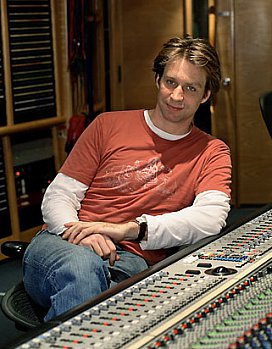
Given his famous father George was the Beatles' longtime producer, there seems almost an inevitability that Giles Martin – coincidentally born on the same date as John Lennon, October 9 – should find his life as a music producer entwined with the Famous Four.
But early on his dad discouraged him from making music a career (he sidestepped him and joined a band then moved into production) and this Martin grew up in the decades after the Beatles had split.
These days, at 42, he has ticked up a very credible track record, among his most successful work being producer on popera singer Hayley Westenra's Pure album in 2003 which became the fastest selling classical album of all time.
But the Beatles were always in the background and he assisted in the production of the Anthology, and then played a guiding role in the controversial Beatles remix album Love (with his father). His most recent project has been producing George Harrison's music for the Martin Scorsese doco Living in the Material World.
The album of early Harrison demos which Giles Martin produced has been lifted from the expensive Material World box set as a stand alone album (Early Takes Vol 1, see review here), and it is that we talk to him about . . . although he is busy on other projects.
“Yes, I have a studio at Abbey Road and so I'm the world of mess and constant work. Today I have to finish a couple of things off for the opening ceremony of the Olympics and some secret Beatles things I'm doing, and then I have to start on a Disney project which I have to finish by July.”
These are all major projects.
[Laughs] I can turn them into minor projects.
We will talk secret Beatles in a minute, but what are you doing for the Olympics?
I can't tell you about either of those two things actually. If I do, someone will get to me and I won't be doing them.
Do I call Steve Rooke and ask him about the Beatles?
You can call but he won't say. Steve won't know until I take it upstairs to him
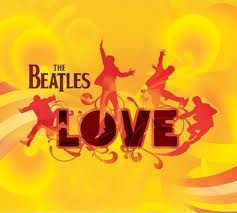 You live in a very secret world.
You live in a very secret world.
Yes, it is interesting. The worst time was when I was doing the Love project because no one was allowed to hear anything at all, the only way anyone could hear anything was to come into the building because you couldn't take anything out. So my friends and family had no idea – although my dad did – what I was doing for a few years.
There must have been an awful amount of trepidation about that, long nights with a whisky and you wouldn't know how it would be received until it was out there in the world.
There was a strange thing and an interesting experience. Initially I suppose in a way I was trying to impress my dad because I hadn't worked with him for a long time. He was nervous about me going too far, and then Paul and Ringo came in for a demo of the concept.
It was about three months before anyone heard it. I played them the opening and my dad didn't want me to play them Within You and Tomorrow Never Knows put together because he thought they would react badly, but they loved it. I was worried about the fans not liking it. Absolutely. But I was more worried about whether they would like it.
Can I say, I loved it because I thought it was what happens in the 21th century. But I could see hardcore Mojo readers might not have liked it. You must have read all they all the reviews keenly.
I don't really read anything of what's been said. In the past I looked for bad stuff and not the good stuff, it's that morbid fascination of looking for the bad things in life.
But I wanted to learn from it and I am happy to get criticism, because it is the world I live in. In England it's like, 'You're the son of George Martin, you couldn't get a proper job'. If you are in America though it's like you are the second coming, which is nowhere near it. It's like [in an American accident] 'Oh my god this guys is amaaazing, just like his Dad”.
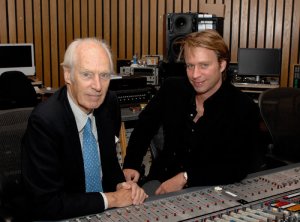 Really is that what happens in England,
people were skeptical?
Really is that what happens in England,
people were skeptical?
They certainly were and I think they should be, I would be as well. And fair enough, because there have been a number of doors opened and opportunities for me because if who my dad was, it is biased and unfair and there is no doubt about that.
But it's good to have something to fight against.
You sound like Prince William.
[Laughs] Yeah, he wants to be a record producer.
You are candid about that, I wouldn't have asked you about your dad because I didn't think it was relevant.
I wasn't trying to be candid, I was just trying to be honest I suppose.
Let's talk about the George album. I have said it was his most consistent album in 40 years because you have gone back to the source material and archive tapes. Was he an assiduous archivist?
Yeah it's not bad. It's half and half. A lot of his work as professional work – and even demos, the quarter inch and half inch reel-to-reel stuff – was on shelves like “Demos 1 to 120” because someone had done it before. Although they hadn't actually listened to everything, so a lot of stuff didn't have titles.
All Things Must Pass tapes were in one shelf but on the other hand Olivia [Harrison] would walk into the studio with a crate full of cassettes. Or we'd find a tape machine with tapes in it, or a reel-to-reel tape with nothing written on it. To be honest we found equally good stuff from both sources.
For the movie we'd find his first sitar lesson with Ravi Shankar on cassette which he had recorded, but the quality would vary.
But on the album I tried to create the thread which showed him off as a singer-songwriter.
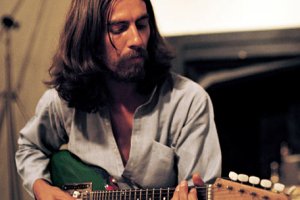 It seemed to me from all I've learned
about George Harrison was that he was far too much the perfectionist
– 99 takes of Not Guilty – but listening to this album I hear a
stripped back, very strong voice. It seems stripped back but not raw
as such. Did you do much with it?
It seemed to me from all I've learned
about George Harrison was that he was far too much the perfectionist
– 99 takes of Not Guilty – but listening to this album I hear a
stripped back, very strong voice. It seems stripped back but not raw
as such. Did you do much with it?
No, I tried to keep . . . Mama You Been on Mind had keyboard and drum machines on it and Olivia really liked it, and I felt sure there was guitar on their somewhere. So we went and found the multi-track which we had to dig up and I found his two acoustic guitar parts which he had put together.
So that was the most produced song on this non-produced record as it were. It's just him and guitar and if you listen closely you can hear the drum machine in the background.
But generally it was a question of making things sound good. There were certain singers and songwriters and everyone knows their sound, but George was one of those people who could go into the studio one day and sing beautifully, then go in the next day and not sing well.
That's a characteristic of his voice.
In the Beatles they would hit their harmonies, – its very rare that on the Beatles outtakes you get bad harmonies – but on some of the other stuff . . .
I think because he was behind John and Paul for so long in his career he was, not shy, but reticent, about being laid bare. I wonder whether he would like this record or not because he loved Bob Dylan and singer-songwriters.
He was always envious of those people and my dad said he was like a craftsman weaving a tapestry, he would sit with a careful needle and thread and work on his records. But there is something instant on this where you just get him and a guitar, and it is quite beautiful. And he has such a unique voice, he is like one of those spoken word singers
Very much so, you can hear the human voice behind it rather than the singing voice. The one that stands out for me is Let It Be Me which I know from all those other sources. Yet when I hear him sing it, it is so simple and clear. Was that just a demo recording?
That was in the film and was used when John was shot, so I mixed for 5.1 stereo. George went to see the Everly Brothers play at the Royal Albert Hall, in the Eighties I think, and as a tribute he went back home – and he would do this quite often, record a song by the artist – and that was his tribute. So he did it that night.
We mixed it and I couldn't get it to sound like the demo, because the demo doesn't sound perfect in any way. For the film it took a long time to remix because there was a fragile thing about it. If you make it sound to good or too confident it doesn't work, because it was really personal thing.
It's hard to get emotion into a double vocal.
I've heard live recordings of George in Japan and he doesn't have the strongest of voices, yet at home in that intimate setting that voice comes through. He was more of a folk singer than a rock singer in a sense.
I think that's true. Of course there was that misfortune of him having throat problems – throat cancer was what he got – and I think that happened, but his throat was so bad when he did that tour and we had the multi-tracks of that. There was that brutality of going there to perform and just not having a voice. I've heard it said before that you sing yourself out and the Beatles did so much performance in Hamburg and so much live stuff that they probably used their voices in the decade of the Sixties more than some people do in their lifetime.
Indeed, I wonder how often Thom Yorke from Radiohead actually sings live.
I remember going to a thing and Celine Dion was there and someone said 'She wants to met you but she's not talking'. She literally wouldn't talk because she needed to save her voice. With the Beatles you had them doing two gigs a night!
So George lost his voice when he went on tour in Japan and that didn't do his reputation any good, but he could be a great singer.
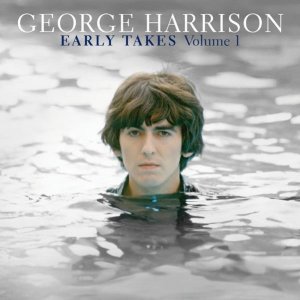 I understand this collection is the
first of more, I read there might be half a dozen albums come out of
this.
I understand this collection is the
first of more, I read there might be half a dozen albums come out of
this.
Olivia made sure we called this Volume 1 and she wants to do a series of records. When we do that I don't know. Realistically I think we will do something next year – and with this album we are not representing George fully.
This was intentionally the singer-songwriter album and was by no means an Anthology-type record. And there is a lot of material at Friar Park. The responsibility is that whatever you put out, you want to make sure everything is in order. We've only scraped the surface because we started doing this when working on the film and the offshoot was the record. We've done about 30 percent of the archiving work and there is already material we didn't put on the record because it wouldn't have suited the mood.
It seems to me there were very interesting and distinct periods in his life and this was the first. But for me the period around Shankar Family and Friends album in '74 is much more interesting than some of the other times. There must be material out of that period which wouldn't fit a chronology or even a picture of George Harrison because it is a slightly different view.
You are absolutely right, this was definitely about George. I grew up with albums and you want it to be an album and not just a selection of tracks which I suppose is irrelevant in the days we in now. But if people buy the record it needs to be a record as opposed it to a collection by George Harrison.
You have probably canvased this many times, but do you remember the first time you met George Harrison, and I mean when you as an adult recognised him.
I didn't meet him very often and we didn't hang out growing up at all. My dad would speak to him but I first remember meeting him and talking as an adult at Linda McCartney's memorial service. He was always very . . . He mixed being charming with being uncomfortable being out. You could tell he would much rather be sitting back home with friends. He liked his friends but was always very nice. He was fascinated by people's children.
A more complex man than we might have been lead to believe, which the doco hinted at.
I'm not sure I could justify that because we are all complex, but I would say he was the one who left the Beatles and got away, and I mean that spiritually. To some extent my dad was so much associated with the Beatles and that's why he [George] went off. But I remember my dad was very sick, he had cancer, and George drove over and brought him a Ganesh and it meant so much to my dad. They never worked together after the Beatles and he got away from his previous existence.
An understandable degree of wariness. I'm talking to you coincidentally as the Ram box set is coming out. Do you have any connection to any of that kind of thing from the McCartney archive or anything else from the Beatles archives?
Not the McCartney but I do have a connection to the Beatles archives. But not to Paul. Funnily enough, it's a good thing because I felt uncomfortable doing George in way because the thing about doing Beatles' stuff you are not in any one corner if you like.
But Paul doesn't need me in the way that Olivia would do, because he makes his own decisions as a musician. I was with Paul last week and he's the one I've known best. I grew up with him, and he has been incredibly supportive and very kind to me. But I'd find it odd having to go through that process with him and there is good material on there, and he's a very good producer in his own right.
Last question then: Ringo?
He's great actually. He recently took my wife and I out for dinner and he goes on these tours because he enjoys it. And I think that's a really good reason. He enjoys it and people go and see him and they enjoy it. He actually has a very good perspective because it's a long time ago when he was a Beatle, and people want you to be 24
I'm looking at the cover of the latest Mojo and it Yellow Submarine from 1968, and that is such a long time gone.
It is and when I saw Paul he said it was the 50th anniversary of when he came into the studio with my dad.
Yes, a long time ago. Can I however wish you al the best with the secret Beatles project.
Thank you, it is actually very exiting.
It better not be a remix of Carnival of Light.
No [laughs] I wouldn't mix that.
There is much more on George Harrison at Elsewhere starting here, and interview with Sir George Martin here. There is also an article about the release of the Beatles' Anthology here, and much more on the Beatles starting here.

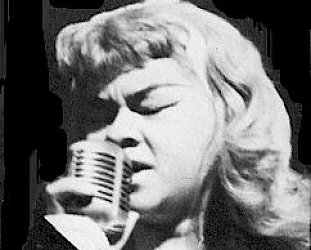
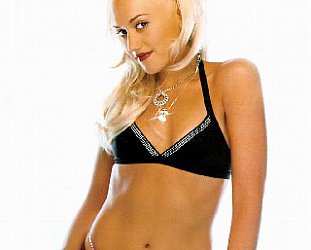
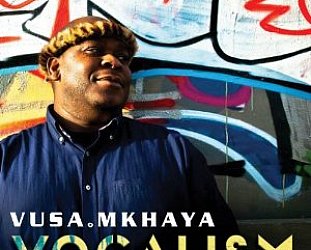
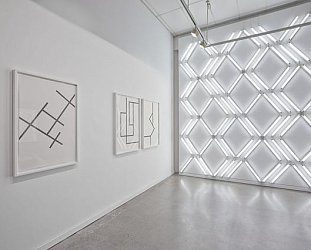
post a comment